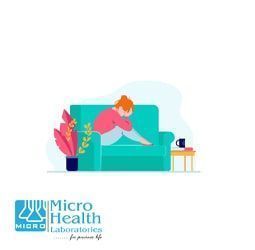
Micro Health Laboratories
Fertility Check Female
Basic health
Infertility
Regular health
Women health
The lab package includes - Endocrinology: Follicle Stimulating Hormone (FSH), Luteinizing Hormone (LH), Thyroid Stimulating Hormone (TSH), Prolactin, Progesterone, Estradiol (E2)
Follicle-stimulating-hormone-fsh
For pregnant women to assess the risk of your baby having a chromosome disorder such as Down syndrome trisomy 21 or Edwards syndrome trisomy 18
Specimen:A blood sample drawn from a vein in your arm or a blood spot collected on special paper from a finger stick a nuchal translucency requires a special ultrasound exam
When To Get Tested: Usually between 11 and 14 weeks of pregnancy
Test Preparation:You may be instructed to have a full bladder when having the nuchal translucency ultrasound performed
Normal Test Result: Males older than age 18: 1.0-18.0 International Units Per Liter (IU/L) Postmenopausal women: 16.7 IU/L -113.6 IU/L
Luteinizing-hormone-lh
To evaluate fertility issues function of reproductive organs ovaries or testicles or to detect the release of an egg from the ovary ovulation to evaluate pituitary function In children to evaluate early or delayed sexual maturation puberty
Specimen:A blood sample drawn from a vein in your arm sometimes a random urine sample or a 24-hour urine collection may be taken
When To Get Tested: For women when you are having difficulty getting pregnant or are having irregular or heavy menstrual periods when you are tracking ovulation during your menstrual cycle For men when your partner cannot get pregnant or you have a low sperm count low muscle mass or decreased sex drive When your healthcare provider thinks that you have symptoms of a pituitary disorder or hypothalamic disorder When a health practitioner suspects that a child has delayed or earlier than expected sexual maturation
Test Preparation:None but the timing of a woman s sample will be correlated with her menstrual cycle
Normal Test Result: Men: 1.42 IU/L to 15.4 IU/L. Women, follicular phase of menstrual cycle: 1.37 to 9 IU/L. Women, midcycle peak: 6.17 to 17.2 IU/L.
Progesterone
To help determine the cause of infertility track ovulation help diagnose an ectopic or failing pregnancy monitor the health of a pregnancy monitor progesterone replacement therapy or help diagnose the cause of abnormal uterine bleeding
Specimen:A blood sample drawn from a vein in your arm
When To Get Tested: At specific times during a woman s menstrual cycle to determine whether when she is ovulating during early pregnancy when symptoms suggest an ectopic or failing pregnancy throughout pregnancy to help determine placenta and fetal health periodically when a person is receiving progesterone replacement therapy when a woman has abnormal uterine bleeding
Test Preparation:None
Normal Test Result: In general, normal serum progesterone test results fall in the following ranges: men, postmenopausal women, and women at the beginning of their menstrual cycle: 1 ng/mL or under. women in the middle of their menstrual cycle: 5 to 20 ng/mL. pregnant women in their first trimester: 11.2 ng/mL to 90 ng/mL.
Prolactin
To help investigate unexplained flow of breast milk galactorrhea abnormal nipple discharge absence of menstrual periods and or infertility in women in men to help diagnose the cause of decreased libido and or erectile dysfunction to detect and monitor a prolactin-producing pituitary tumor prolactinoma
Specimen:A blood sample drawn from a vein in your arm
When To Get Tested: When you have symptoms of elevated prolactin such as galactorrhea and or visual disturbances and headaches during a workup for infertility for follow-up of low testosterone in men periodically to monitor for recurrence of a prolactinoma
Test Preparation:None however the sample should be collected 3 to 4 hours after waking
Normal Test Result: The normal values for prolactin are: Men: less than 20 ng/mL (425 µg/L) Nonpregnant women: less than 25 ng/mL (25 µg/L) Pregnant women: 80 ng/mL to 400 ng/mL (80 to 400 µg/L)
Thyroid-stimulating-hormone-tsh
To screen for and help diagnose thyroid disorders to monitor treatment of hypothyroidism and hyperthyroidism
Specimen:A blood sample drawn from a vein in your arm or from pricking the heel of an infant
When To Get Tested: For screening Newborn screening is widely recommended however there is no consensus within the medical community as to the age adult screening should begin or whether screening should be done For monitoring treatment as directed by your healthcare provider Otherwise when a person has symptoms of hyperthyroidism or hypothyroidism and or an enlarged thyroid
Test Preparation:None needed however certain medications can interfere with the TSH test so tell your health practitioner about any drugs that you are taking If you take thyroid hormone as treatment for thyroid disease it is recommended that your blood sample be drawn before you take your dose for that day
Normal Test Result: from 0.4 mIU/L to 4.0 mIU/L for those with no symptoms of an under- or over-active thyroid
-
5 Tests Included
-
- Follicle-stimulating-hormone-fsh
- Luteinizing-hormone-lh
- Progesterone
- Prolactin
- Thyroid-stimulating-hormone-tsh
Pay Online Pay at Center
₹1575.00
₹2100.00
25% OFF








